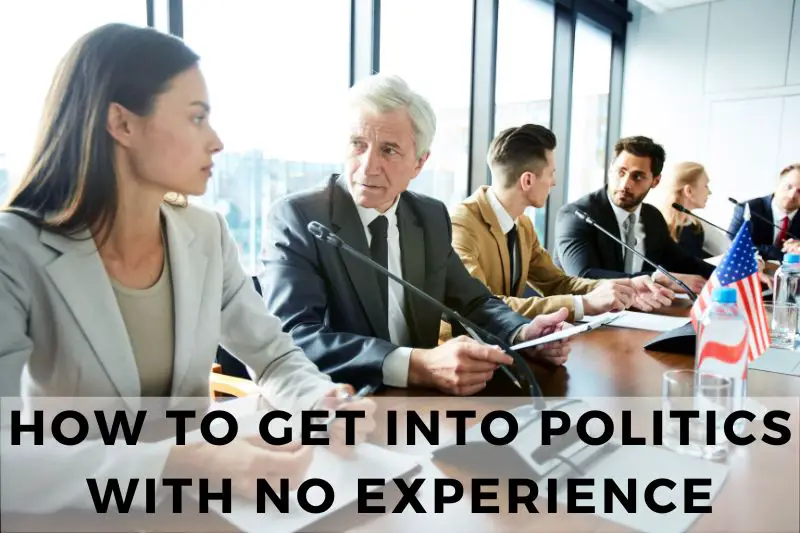
Entering politics can seem like a daunting task, especially if you have no prior experience. However, the path to becoming a political figure is not limited to those with a long history in the field. Many successful politicians started with little more than a passion for change and a desire to serve their community.
Whether you’re interested in local or national politics, there are numerous ways to break into the political world and make a meaningful impact. This article outlines practical steps to help you get started in politics, even without prior experience.
13 Ways to Enter Politics Even With No Experience
#1. Identify Your Political Interests and Values
The first and most important step to entering politics is understanding what drives you. Politics is about more than just holding a position; it’s about fighting for the issues that matter to you.
- Assess your core beliefs: Take time to reflect on your personal experiences, values, and what changes you want to see in the world. Do you believe in climate change action, education reform, or social justice?
- Clarify your values: Understanding the values that guide your decisions will help you align with the right political parties or movements. Your values may include equality, fairness, justice, and freedom, or something more specific like supporting small businesses or advocating for mental health.
- Research political ideologies: Understand the spectrum of political ideologies—liberalism, conservatism, libertarianism, etc.—and identify which one resonates with your views. You may also want to explore lesser-known political movements that align more closely with your values.
#2. Start Volunteering for Campaigns or Causes
Volunteering is an invaluable way to build experience in the political field. It gives you hands-on experience with the day-to-day tasks involved in political campaigns or community activism.
- Join local political campaigns: Volunteering for a local candidate’s campaign allows you to understand the behind-the-scenes work, from canvassing and phone banking to event planning and fundraising.
- Support nonprofit causes: Many political movements are driven by nonprofit organizations. Volunteering for such organizations helps you gain experience with advocacy, lobbying, and public outreach.
- Get involved in grassroots efforts: Grassroots movements often require dedicated volunteers who help organize rallies, protests, and petitions. By getting involved in these movements, you can connect directly with the public and create a real impact.
#3. Attend Local Government Meetings and Town Halls
Attending government meetings and town halls helps you better understand the local political environment and the issues affecting your community.
- Attend city council or school board meetings: These meetings allow you to see how elected officials make decisions and how local laws and policies are passed. Observing these proceedings gives you insight into the challenges and responsibilities faced by politicians.
- Participate in town halls: Town hall meetings are open forums where citizens can directly engage with elected officials. Ask questions, raise concerns, or offer solutions to demonstrate your interest in local governance.
- Build relationships with officials: By attending these meetings regularly, you’ll build relationships with your local elected officials, which could open doors for future political involvement.
#4. Pursue Public Speaking and Debate Skills
Being able to communicate your ideas clearly and persuasively is a critical skill in politics. Developing public speaking and debate skills early will give you the confidence to engage in political discourse.
- Take public speaking courses: Public speaking courses teach you how to organize and deliver your message effectively. You’ll learn how to project your voice, use body language, and structure speeches.
- Join a debate club or team: Debate helps you sharpen your critical thinking, develop strong arguments, and articulate your position in front of others. A debate club also offers practice in handling counterarguments, a key skill for politicians.
- Practice storytelling: Political speeches are often most powerful when they connect with people emotionally. Learning how to tell stories and use metaphors effectively can help you craft speeches that resonate with your audience.
#5. Engage with Your Community
Understanding the needs and concerns of your community is essential for becoming a successful politician. Engaging with your community allows you to build trust and credibility.
- Volunteer at local events: Participate in community activities such as charity events, neighborhood cleanups, or local sports leagues. These engagements allow you to meet people from different walks of life and understand their challenges.
- Listen to local issues: Pay attention to what residents are discussing in coffee shops, online forums, and at social gatherings. Take note of the issues that matter most to your community.
- Organize local initiatives: If you see a problem that needs attention, take the initiative to address it. Whether it’s hosting a town hall or leading a petition, organizing local events shows your commitment to change.
#6. Join or Create Political Networks
Networking is essential to gaining political influence. By joining existing networks or creating your own, you expand your access to resources, mentorship, and support systems.
- Join political organizations: Many political parties, think tanks, and advocacy organizations offer opportunities for newcomers to get involved. Look for groups that share your political interests and values.
- Create your own network: If the right political network doesn’t exist, create one. Whether it’s a local youth political group, an issue-based coalition, or an activist circle, building your own network gives you control and helps amplify your voice.
- Seek mentorship: Networks provide opportunities for mentorship from seasoned politicians who can guide you through the complexities of political life. Their experience can save you from common pitfalls and help you avoid mistakes.
#7. Pursue Training in Political Science or Public Administration
Formal education can deepen your understanding of the political system and improve your ability to craft policies.
- Enroll in relevant courses: Political science, public administration, and law programs provide comprehensive knowledge about the political system, governance, and public policy.
- Learn the mechanics of government: Gain insight into how local, state, and national governments function, including the legislative process, the judicial system, and executive operations.
- Develop research and analytical skills: Political science programs teach you how to research and analyze public policies, an essential skill for any political career.
#8. Consider Running for Local Office
If you’re ready to take your political aspirations to the next level, running for local office is one of the best ways to gain experience and visibility.
- Start small: Run for positions that don’t require extensive political experience, such as a local school board, city council, or neighborhood association. These positions allow you to get a feel for politics while having a tangible impact on your community.
- Understand the role: Research the responsibilities and challenges of the office you’re running for. This preparation will help you create a clear, relevant platform for voters.
- Engage with constituents: Use your campaign to engage with voters, listen to their concerns, and make promises based on their needs.
#9. Seek Mentorship from Experienced Politicians
Mentorship plays a significant role in a politician’s growth. By learning from seasoned politicians, you can navigate the political field more effectively.
- Reach out to potential mentors: Find experienced politicians who share your values and are willing to offer guidance. Politicians with years of experience often have valuable insights to offer.
- Ask for advice and feedback: Mentors can provide advice on how to build a successful political career, run a campaign, or resolve conflicts within your community.
- Build a relationship based on trust: A mentorship is a two-way relationship. Be open, respectful, and willing to learn. A solid mentor-mentee relationship can open doors and provide a foundation for future opportunities.
#10. Stay Informed on Current Affairs and Legislation
Staying informed about current events, policies, and political debates is crucial for any aspiring politician.
- Follow the news: Regularly read newspapers, watch political talk shows, and listen to podcasts to stay updated on current events, especially those related to the issues that matter to you.
- Understand legislative processes: Familiarize yourself with how laws are made, debated, and passed at the local, state, and national levels. This knowledge will help you navigate the political system and understand where your efforts can make the most impact.
- Engage with experts: Attend forums, webinars, or conferences on current political issues to broaden your understanding and engage with thought leaders.
#11. Build a Network of Supporters
A successful political career is not built alone—it requires a strong base of supporters who can help champion your cause.
- Cultivate relationships: Build connections with people who share your values and vision. These individuals can offer not just support but also advice and guidance as you grow in politics.
- Leverage social media: Social media is a powerful tool for building a public presence, engaging with voters, and spreading your message. Use platforms like Twitter, Facebook, and Instagram to communicate your values and interact with your followers.
- Create a coalition of supporters: Reach out to like-minded organizations, community leaders, and activists to form coalitions that can help amplify your voice and your cause.
#12. Demonstrate Leadership and Integrity in Non-Political Roles
Strong leadership skills and integrity are essential for anyone seeking a career in politics. Demonstrating these qualities in non-political settings can help establish your reputation.
- Lead by example: Whether you’re heading a community project, volunteering at a local organization, or running a small business, showcase leadership and integrity in all aspects of your life.
- Make tough decisions: Politics often requires difficult decision-making. By practicing these skills in your personal or professional life, you’ll be better prepared for the challenges of a political career.
- Build trust: People will only follow you if they believe in your honesty, transparency, and ability to make decisions with the public’s best interest in mind.
#13. Organize Grassroots Movements
Grassroots movements are some of the most effective ways to generate support for political change.
- Start with local issues: Identify problems in your community—whether it’s education, healthcare, housing, or the environment—and start organizing to address them.
- Use digital tools: Harness social media and online platforms to spread awareness, gather signatures, and organize events.
- Mobilize people: Engage your community by hosting rallies, meetings, and public forums to raise awareness and generate support for your cause.
Conclusion
Entering politics without prior experience may seem daunting, but it’s entirely possible with the right strategies and determination. The key is to start by identifying your political interests, values, and passions, then gradually gain experience through volunteering, community engagement, and education. Building strong networks, seeking mentorship, and staying informed on political issues will provide you with the foundation needed to succeed.
Remember, politics is not just about holding a position of power; it’s about making a difference in your community and advocating for what matters most to you and others. By following the steps outlined above, you’ll be well on your way to stepping into the political arena—regardless of your background or experience. Keep your focus on learning, growing, and connecting with others who share your vision for a better future, and you’ll find success in your political journey.
